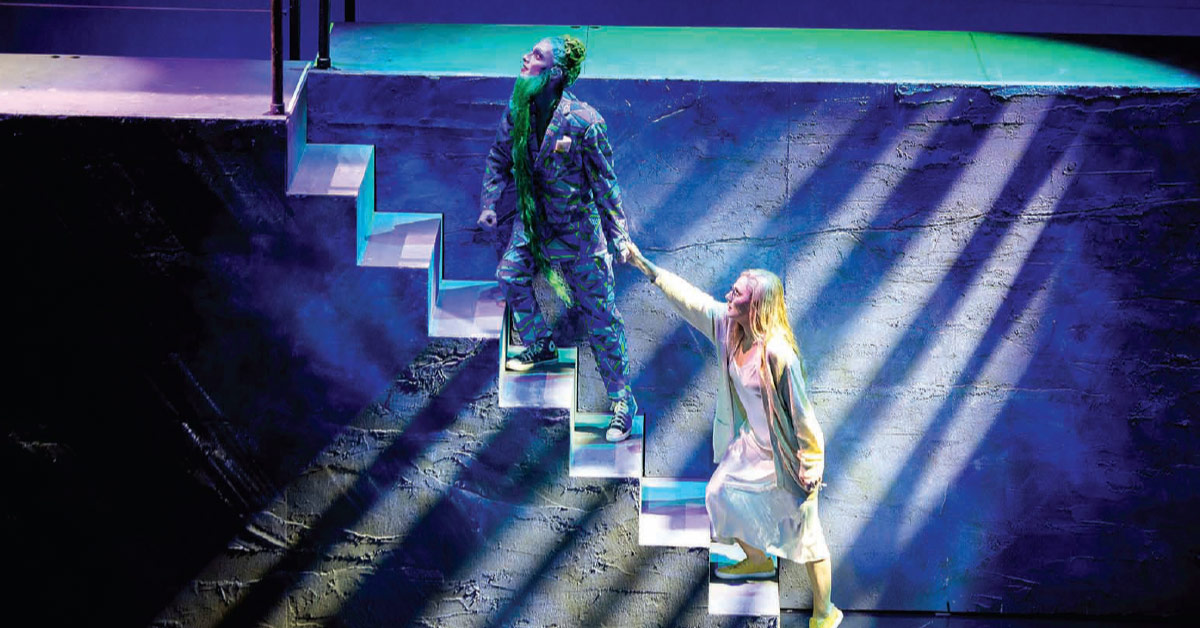First staged in October of 1600, Jacopo Peri’s “Euridice” is the oldest surviving opera. Peri, in sympathy with the majority of Florence’s musicians and men of letters, found inspiration in the spare and resonant stories of the ancient world.
That the opera was inspired by the tale of Orpheus and Eurydice proved to be no outlier; the 17th century alone saw twenty operas based on the myth. All told, over seventy operas tell the story of the singer who descends into Hades to rescue his beloved Eurydice—or to nearly do so.
Among the latest is Matthew Aucoin’s Eurydice. An adaptation of Sarah Ruhl’s play of the same name, it debuted at the Los Angeles Opera in February of 2020 before a run at the Metropolitan Opera in November of 2021. A scaled-down version, co-commissioned by Boston Lyric Opera and Opera Grand Rapids, will play at the Betty Van Andel Opera Center January 31st-February 1st.
Asked why the story continues to inspire new art, Emilee Syrewicze, Executive Director of Opera Grand Rapids, points to its humanity. “Even though it’s an ancient story, the complications of human relationships are as old as time. Those things won’t change as long as humans exist.”
Aucoin agrees that its themes are evergreen. “This is the foundational story that tells us that music can conquer death, that it can triumph over our mortality. It endures not only for that reason, but it’s pretty brutal about human nature. Yes, music can make us briefly immortal, but we’re human. We’re going to screw things up.”
Aucoin had been considering an expansion on an Orphic piece he’d written when his sister recommended he read Ruhl’s play. When he did, he found it to be magical. “You think you know the story, you think it’ll be a retelling, but it’s not.” The play, he found, told a story about loss, family, memory, “and what you can–and cannot-take from this world.”
He knew he wanted to work with Ruhl. He reached out, suggesting a collaboration. Ultimately, they decided to collaborate on an adaptation of her play: libretto by her, music by him. He found it to be a relatively painless process. “The play was already pretty spare. It wasn’t like cutting down Shakespeare, where you have to throw out 90% of the words.”
Like the play, the opera centers Eurydice rather than Orpheus. She operates in a greater emotional range than anyone else in the show. As the opera opens, she’s a teenager. She dies twice; she loses her memory. “In the most mysterious aspect of the play, we see her grow up. She becomes fully herself only in death, as she remembers what love and life were.”
It’s a lot to ask of a singer. “She has to sound like everything: a young girl, a wounded lover, like someone who has dementia. Everyone else has one fewer dimension.”
Another striking depiction in the show is Hades. In other productions, he’s given a stunningly low voice (his songs in Hadestown could be used to test your car speakers’ low end). In Eurydice, he sings in what Aucoin calls a “stratospherically high range.” Here, the ruler of the underworld is a little insane, somewhere between a petulant child and an extraterrestrial being interacting with humans.
There’s a grandeur to Aucoin’s adaptation that’s uncommon among contemporary operas, many of which err on the side of minimalism. Despite that grandeur, it’s often intimate. The opportunity to pare the show back, to transform it from grand opera to a chamber piece, serves to reveal the intimacy that was always present. After the show’s Boston premiere, several audience members who’d seen it in its earlier incarnation told Aucoin they thought nothing had been lost.
Syrewicze is proud to be bringing Eurydice to Opera Grand Rapids, something she sees as squarely within the organization’s mission. “Every genre has to evolve, to keep creating, or it’ll become obsolete,” she said. “Otherwise, once you’ve seen the popular shows, why keep going? We don’t want that to happen. We have to keep working.”
It’s rare for a company of Opera Grand Rapids’ size to feature acclaimed contemporary shows. In 2020, as the pandemic raged, the company pivoted to streaming, providing a way for audiences to see Scalia/Ginsburg. In 2020, the company staged Stinney’s world premiere, a show still viewable via PBS today.
In 2022, Aucoin served as a judge for the Vanderlaan Prize Competition. During his time here, he got to know Syrewicze and her team as well as the physical space; that last, he realized, would be perfect for a reduced-orchestral version of Eurydice.
“It scales fantastically,” said Syrewicze. “It’s so visual. When Hades emerges onstage, you just cannot not look at him. The way it’s composed is so interesting. It builds but not in a melodic way, in a percussive way, and then he inserts these beautiful moments. Opera is music, it’s acting, it’s the visual depiction of the story. It’s all those things. Eurydice is always surprising.”
Eurydice
Opera Grand Rapids
1320 Fulton St., Grand Rapids
Jan. 31-Feb. 1
operagr.org





